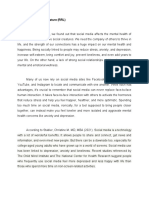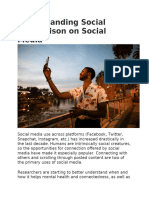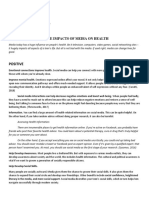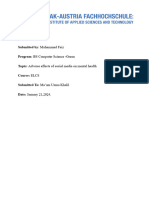Social Media Has Become An Integral Part of Our Lives
Social Media Has Become An Integral Part of Our Lives
Uploaded by
Pierre BaherCopyright:
Available Formats
Social Media Has Become An Integral Part of Our Lives
Social Media Has Become An Integral Part of Our Lives
Uploaded by
Pierre BaherOriginal Title
Copyright
Available Formats
Share this document
Did you find this document useful?
Is this content inappropriate?
Copyright:
Available Formats
Social Media Has Become An Integral Part of Our Lives
Social Media Has Become An Integral Part of Our Lives
Uploaded by
Pierre BaherCopyright:
Available Formats
Social media has become an integral part of our lives, but it has also been linked to
negative effects on mental health. In this essay, we will explore the impact of social
media on mental health and discuss ways to mitigate its negative effects.
According to a study conducted by the National Center for Health Research, people
who frequently use social media feel more depressed and less happy with life than those
who spend more time on non-screen-related activities. Another study by the Child
Mind Institute suggests that social media use has been linked to depression, anxiety,
and loneliness. These studies indicate that social media can have a significant impact on
mental health.
One of the reasons why social media can be detrimental to mental health is that it can
be addictive. Social media apps and websites have the same kind of effect on the brain
as playing a slot machine. Since you don’t know the content you’ll see until you open
the app, the spontaneous results actually cause a feeling of “reward” by releasing
dopamine—the same chemical linked to other pleasurable activities such as sex and
food. This can lead to compulsive behavior and addiction.
Another reason why social media can be harmful is that it can create feelings of
inadequacy and low self-esteem. People often compare themselves to others on social
media, which can lead to feelings of inferiority. Filters and photo editing tools can create
unrealistic expectations about beauty and body image, leading to body dissatisfaction
and eating disorders.
Social media can also lead to cyberbullying, which can have a significant impact on
mental health. Cyberbullying is a form of bullying that takes place online or through
digital devices. It can cause anxiety, depression, and even suicide.
Despite these negative effects, social media can also have positive effects on mental
health. It can help people connect with others who share similar interests and provide a
sense of community. Social media can also be used as a tool for education and
awareness-raising about mental health issues.
To mitigate the negative effects of social media on mental health, it is important to use
it in moderation. Limiting screen time and taking breaks from social media can help
reduce compulsive behavior and addiction. It is also important to be mindful of how
social media affects your mood and self-esteem. If you find that social media is having a
negative impact on your mental health, consider taking a break or seeking professional
help.
In conclusion, social media has both positive and negative effects on mental health.
While it can provide a sense of community and raise awareness about mental health
issues, it can also be addictive, create feelings of inadequacy, lead to cyberbullying, and
negatively impact mental health. By using social media in moderation and being mindful
of its impact on our mental health, we can mitigate its negative effects.
You might also like
- CHCPAL001 Assessment 1Document14 pagesCHCPAL001 Assessment 1dev kumar75% (4)
- The Effects of Social Media On Mental HealthDocument2 pagesThe Effects of Social Media On Mental Healthfatin100% (2)
- Introducing The MMPI-2-RF: DisclosureDocument41 pagesIntroducing The MMPI-2-RF: DisclosureRina FitrianiNo ratings yet
- Anti-Aging PLR Main Download PageDocument7 pagesAnti-Aging PLR Main Download PageSameer MhaskarNo ratings yet
- Defining The Role of Social Workers in Diabetes CareDocument3 pagesDefining The Role of Social Workers in Diabetes CareLiliana RicoNo ratings yet
- Psychiatric Nursing NotesDocument12 pagesPsychiatric Nursing NotesKarla Fralala0% (1)
- The Impact of Social Media On Mental HealthDocument2 pagesThe Impact of Social Media On Mental HealthDAVE GABAYNO75% (4)
- Chapter 1Document11 pagesChapter 1Sugar PandaNo ratings yet
- The Social Media Becoming A Quite Popular Nowadays, and A Large of People Using It in Their DailyDocument3 pagesThe Social Media Becoming A Quite Popular Nowadays, and A Large of People Using It in Their DailySohaib ZouNo ratings yet
- The Impact of Social Media On Mental Health - Exploring The EvidenceDocument2 pagesThe Impact of Social Media On Mental Health - Exploring The EvidenceTMU ba15109015No ratings yet
- SociologyDocument6 pagesSociologyAli HusnainNo ratings yet
- Multimodal Final Essay - Erin MitchellDocument6 pagesMultimodal Final Essay - Erin Mitchellapi-711377035No ratings yet
- LecturaDocument7 pagesLecturaαηтσ??No ratings yet
- 1Document1 page1⸻⸻⸻⸻⸻⸻⸻⸻⸻⸻⸻⸻⸻⸻⸻⸻⸻⸻⸻⸻⸻⸻⸻⸻⸻⸻⸻⸻⸻⸻⸻⸻⸻⸻⸻⸻No ratings yet
- PpaperDocument2 pagesPpapertommyNo ratings yet
- Review of Related Literature - PURCOMDocument3 pagesReview of Related Literature - PURCOMJanine Ces Aleda EspinosaNo ratings yet
- Why You Should Quit Social Media 2Document6 pagesWhy You Should Quit Social Media 2api-650392913No ratings yet
- What Is Social Media AddictionDocument9 pagesWhat Is Social Media AddictionabcdNo ratings yet
- Gerardo Partida - Mla Typed Final EssayDocument5 pagesGerardo Partida - Mla Typed Final Essayapi-719521707No ratings yet
- Essay Madam NoreenDocument5 pagesEssay Madam Noreenjawad.bashir m bashirNo ratings yet
- The Impact of Social Media On Mental HealthDocument2 pagesThe Impact of Social Media On Mental HealthFerran MassoNo ratings yet
- What Is Social Media Addiction - Article 2Document3 pagesWhat Is Social Media Addiction - Article 2mehmetyilmaz0634No ratings yet
- English 1-5 Essay CompositonDocument3 pagesEnglish 1-5 Essay Compositondd86v7vnykNo ratings yet
- Social Media AddictionDocument11 pagesSocial Media AddictionNorfatmah DandamunNo ratings yet
- The Causes and Effects of Social Media Addiction.Document4 pagesThe Causes and Effects of Social Media Addiction.Abdo ZezoNo ratings yet
- All About Apis and KpisDocument2 pagesAll About Apis and KpisoONo ratings yet
- The Impact of Social Media On Mental HealthDocument6 pagesThe Impact of Social Media On Mental HealthirumwamaNo ratings yet
- The Impact of Social Media On Mental HealthDocument2 pagesThe Impact of Social Media On Mental HealthTrivena Gracia SiraitNo ratings yet
- The Impact of Social Media On Mental Health - EditedDocument6 pagesThe Impact of Social Media On Mental Health - EditedirumwamaNo ratings yet
- Science and Technnology ArticleDocument6 pagesScience and Technnology ArticleZ DceNo ratings yet
- Literature Review 2Document3 pagesLiterature Review 2api-548813745No ratings yet
- Growing Influence of Social Media On Mental HealthDocument11 pagesGrowing Influence of Social Media On Mental HealthMark Daryll BaluarteNo ratings yet
- 4 Social Media AddictionDocument3 pages4 Social Media AddictionayaNo ratings yet
- Social Media and Our MindsDocument2 pagesSocial Media and Our MindstepaneroashlynNo ratings yet
- The Impact of Social Media On Teenagers' Mental HealthDocument3 pagesThe Impact of Social Media On Teenagers' Mental HealthpheliquecampbellNo ratings yet
- Assignment 1..Document11 pagesAssignment 1..Vishal BhagatNo ratings yet
- Social Media Final DraftDocument11 pagesSocial Media Final Draftapi-404797244No ratings yet
- Understanding Social Comparison On Social MediaDocument7 pagesUnderstanding Social Comparison On Social Mediadarell.brown.202007033No ratings yet
- Disadvantages of Social MediaDocument3 pagesDisadvantages of Social Medialwess112233No ratings yet
- Sample Argumentative TextDocument1 pageSample Argumentative Textblairemeri09No ratings yet
- How Social Media Affects Humans Mental HealthDocument5 pagesHow Social Media Affects Humans Mental HealthNagma MalaviyaNo ratings yet
- TitleDocument2 pagesTitlewong bryanNo ratings yet
- article on stem subjectsDocument6 pagesarticle on stem subjectsmomalkhan2311No ratings yet
- Text DocumentDocument3 pagesText Documentpiwer73750No ratings yet
- Media Impact On HealthDocument2 pagesMedia Impact On HealthDon J AsuncionNo ratings yet
- Social Media AddictionDocument7 pagesSocial Media AddictionNisa ShaqiriNo ratings yet
- The Impact of Social Media On Mental HealthDocument1 pageThe Impact of Social Media On Mental Health⸻⸻⸻⸻⸻⸻⸻⸻⸻⸻⸻⸻⸻⸻⸻⸻⸻⸻⸻⸻⸻⸻⸻⸻⸻⸻⸻⸻⸻⸻⸻⸻⸻⸻⸻⸻No ratings yet
- What Is Social Media Addiction? A.BackgroundDocument4 pagesWhat Is Social Media Addiction? A.BackgroundGreynaldi GasraNo ratings yet
- The Impact of Social Media On Teen Mental Health and Well BeingDocument4 pagesThe Impact of Social Media On Teen Mental Health and Well BeingAlthea Claire BallesツNo ratings yet
- Mental Health in The Digital AgeDocument13 pagesMental Health in The Digital AgeElmustafa IboustatenNo ratings yet
- PT 3 Is Social Media Making You MiserableDocument3 pagesPT 3 Is Social Media Making You Miserablequem odtohanNo ratings yet
- Research Paper Final PortfolioDocument10 pagesResearch Paper Final Portfolioapi-359555488No ratings yet
- The Dark Side of Social MediaDocument1 pageThe Dark Side of Social MediaYusef IsamNo ratings yet
- The Impact of Social Media on Mental HealthDocument3 pagesThe Impact of Social Media on Mental HealthRaiserNo ratings yet
- Hamdan_Social Media A Toll On The Mental Health_Assignment 1Document6 pagesHamdan_Social Media A Toll On The Mental Health_Assignment 1sangatabdaalNo ratings yet
- Adverse Effects of Social MediaDocument8 pagesAdverse Effects of Social Mediarockzz4231No ratings yet
- The Influence of Social Media On Adolescent Mental HealthDocument2 pagesThe Influence of Social Media On Adolescent Mental Healthlaylamansour41182No ratings yet
- Draft Essay4Document3 pagesDraft Essay4byfysiteheNo ratings yet
- Resorch Paper 3Document3 pagesResorch Paper 3Ahmed AlaouiNo ratings yet
- 4Document2 pages4vafanot328No ratings yet
- Mental Health Research PaperDocument3 pagesMental Health Research PapermastercodystrongNo ratings yet
- Assignment 1 HSMCDocument11 pagesAssignment 1 HSMCVishal BhagatNo ratings yet
- The Influence of Technology On Contemporary ArtDocument1 pageThe Influence of Technology On Contemporary ArtRudra MalhotraNo ratings yet
- Comm 424 ProposalDocument8 pagesComm 424 Proposalapi-582248232No ratings yet
- Case History: By, Madhu Varma M.Phil. 1 Year NiepidDocument13 pagesCase History: By, Madhu Varma M.Phil. 1 Year Niepidsucess psychologyNo ratings yet
- Goldberg Health QuestionnaireDocument3 pagesGoldberg Health QuestionnaireScribdTranslationsNo ratings yet
- UnisaDocument7 pagesUnisaAnonymous koX40Ei100% (6)
- Phe Mock E-Portfolio Task 1 Specific Clarification (05 Pages Max)Document5 pagesPhe Mock E-Portfolio Task 1 Specific Clarification (05 Pages Max)Malaika Ekochu100% (1)
- G7 Long QuizDocument3 pagesG7 Long QuizJubylyn AficialNo ratings yet
- Emotional Intelligence BY Syed Muhammad AsimDocument24 pagesEmotional Intelligence BY Syed Muhammad Asimgandhi024No ratings yet
- CGC Annual Report FY2012Document12 pagesCGC Annual Report FY2012Child Guidance CenterNo ratings yet
- Eating DisorderDocument18 pagesEating DisorderHoney Bee S. PlatolonNo ratings yet
- Certificate of Readiness To Enter Specialty TrainingDocument12 pagesCertificate of Readiness To Enter Specialty TrainingBubrak AminNo ratings yet
- Chapter 2Document29 pagesChapter 2seyfelizelihaNo ratings yet
- Health Education PlanDocument3 pagesHealth Education PlanAlexandria P. OrcajadaNo ratings yet
- Module 11Document9 pagesModule 11aya brea antalanNo ratings yet
- Neglected Children (An Emperical Study) Sociology: Submitted byDocument25 pagesNeglected Children (An Emperical Study) Sociology: Submitted byAnonymous 0ppGK23hNo ratings yet
- Are The Effects? Note Convince The Panel That There Is A Need To Conduct The ResearchDocument5 pagesAre The Effects? Note Convince The Panel That There Is A Need To Conduct The ResearchRichmon SantosNo ratings yet
- Sketch - Winter - 2010Document28 pagesSketch - Winter - 2010boogerballNo ratings yet
- PYC4802 Examination FinalDocument6 pagesPYC4802 Examination FinalTiffany SmithNo ratings yet
- Conduct Disorder: Shreya MalhotraDocument14 pagesConduct Disorder: Shreya Malhotradiya gautamNo ratings yet
- Brenda Huffstutler, MSW - ResumeDocument2 pagesBrenda Huffstutler, MSW - ResumenaleolanigalNo ratings yet
- The Intolerance of Uncertainty Scale: Psychometric Properties of The English VersionDocument15 pagesThe Intolerance of Uncertainty Scale: Psychometric Properties of The English VersionNoor BahrNo ratings yet
- The State of Organizations 2023Document5 pagesThe State of Organizations 2023nanimaca33120No ratings yet
- Catalyzing Self Advocacy - An Experiment in IndiaDocument131 pagesCatalyzing Self Advocacy - An Experiment in IndiaantcbeNo ratings yet
- DSM 5 IntroDocument9 pagesDSM 5 IntroSURYANo ratings yet
- Narcisstic Personality DisorderDocument11 pagesNarcisstic Personality DisorderAdriana Bogdanovska Toskic100% (1)
- Effectiveness of Supportive Therapy 21-27 PDFDocument7 pagesEffectiveness of Supportive Therapy 21-27 PDFIndian Journal of Psychiatric Social WorkNo ratings yet
- Parenting and Childhood Anxiety: Theory, Empirical Ndings, and Future DirectionsDocument18 pagesParenting and Childhood Anxiety: Theory, Empirical Ndings, and Future DirectionsDenís Andreea PopaNo ratings yet

























































































